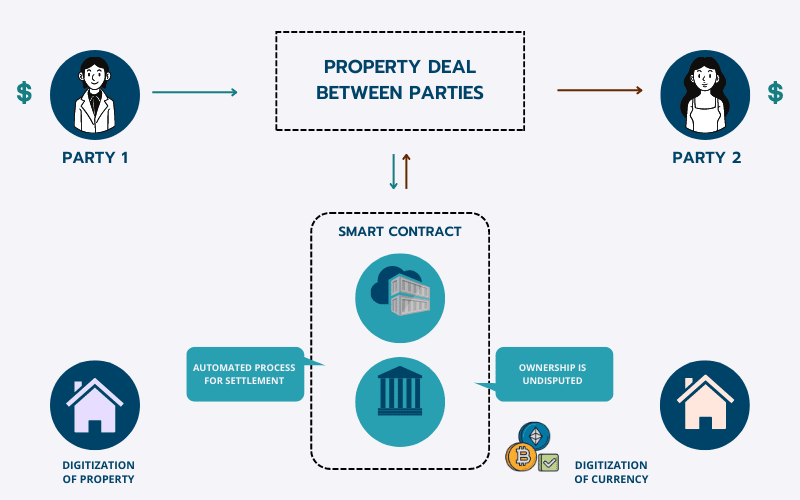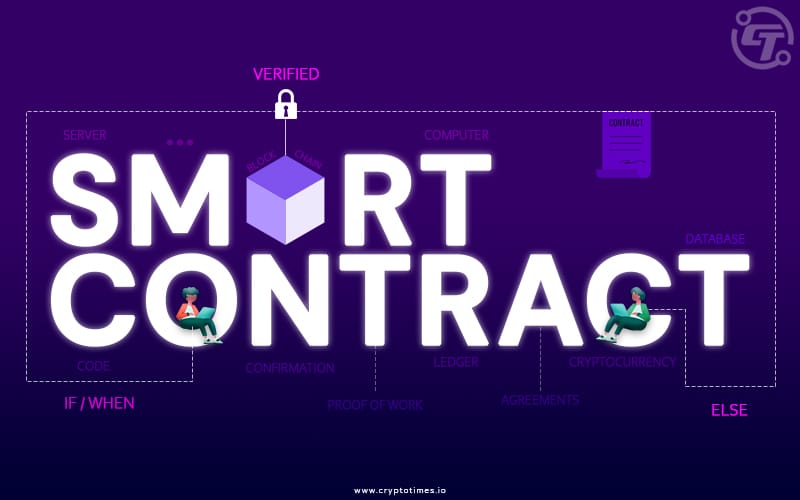As screen took over paper in this digital era, Smart Contracts have become the classic climax of passé Contract Law! And why wouldn’t it be the case? Imagine the fuss and the exhaustive slog that was called for such a dreary task.
Simply called the ‘self-executed contract’, there’s more to these programs. Let’s take a look at what entails this novel technology.
What are Smart Contracts?
“Smart property might be created by embedding smart contracts in physical objects.”
–Nick Szabo
Smart contracts were first coined in 1994 by Nick Szabo. Szabo is an American computer scientist who created a virtual currency called “Bit Gold” in 1998 (note that this was a decade before the invention of bitcoin).
Szabo described smart contracts as ‘computerized transaction protocols that execute terms of a contract’.
Thus, a smart contract is an agreement between two people in the form of computer code. Smart contracts run on the blockchain, so they are stored on the public database(ledger). Processed by the blockchain, smart contracts can be sent automatically without a third party.
They’re often used to automate the execution of an agreement so that all parties can be certain of the conclusive events. They can also self-activate a workflow, activating the subsequent steps when certain circumstances are satisfied. The code controls the execution, and makes sure that the transactions are trackable and irreversible.
One of the most popular blockchains that supports smart contracts is Ethereum. Grouped together as code and data, the contracts live on the Ethereum blockchain on a single address.
These agreements, like conventional contracts, can lay down conditions and have them enforced automatically through programming.
How do smart contracts work?
Smart contracts work by the fundamental logic of ‘if/when…then…’ programming statements that are written on a blockchain. When pre-positioned conditions are met, a network of computers can set off various functions.
Speaking of its core structure, smart contracts are built by developers keeping in mind the requirements of the clients.
The logic is then developed and tested on a smart contract-writing platform to ensure that it performs as planned. After the application is written, it is passed on to a security review team.
The contract is then deployed on an existing blockchain or other distributed ledger infrastructure once it has been approved. Following which, it is configured to listen to event updates from an “oracle” , which is also cryptographically secure.
Thus, conditions such as payment authorization, shipment receipt, or a threshold limit for a particular quantity are checked by the smart contract. Once met functions including transferring payments to the proper parties, registering a vehicle, providing alerts, or issuing a ticket and so on are automatically activated.

Given above is an instance of a property deal where in smart contracts automates the settlement to offer an undisputed ownership. The contract makes the whole transaction look like a cup of tea with the digitization of property and digitization of currency.
Applications of Smart Contracts
Well, thanks to the underlying security and reliability, smart contracts have a long list of applications and thus, successful use cases. Some of its applications are:
- Democratic Voting System:
“The ballot is stronger than the bullet”.
-Abraham Lincoln.
Smart contracts make voting more secure by making it less susceptible to meddling. The votes in smart contracts are ledger-protected, making them difficult to decipher or even retrieve.
Furthermore, smart contracts have the potential to increase historically low voter attendance. Also, voting can expand the number of participants in a voting system when it is transferred online using smart contracts.
Countries like the United States, Russia, Japan, and Sierra Leone have already used a blockchain-backed voting system. While other countries including India, South Korea, and Thailand are working on a similar project at a PoC level.
- In Healthcare:
One thing that the pandemic has shown us is how quickly healthcare can crumble even in the most advanced countries. However, with blockchain, one can still have great hopes!
With a private key, blockchain can easily store patients’ encoded health records. The security will make these decoded records accessible to only particular individuals.
This will also make the job of insurance providers and drug supply management easier.
For instance, ‘Doctors Without Borders’ used this technology for medical recording purposes. Another Medical Service company, MDS verified and checked the authenticity of Covid-19 test results using smart contracts.
- In Supply Chain:
Isn’t the paper-based system outdated already? They have long been routed through many channels for approval, and have historically jeopardized the logistics network.
Blockchain can eliminate the chances of scam and loss by offering involved parties secured digital versions. Smart contracts can also be used for inventory management as well as payment and task automation.
For instance, recently, OpsChain Supply Chain Manager was launched on a Layer 2 Ethereum blockchain to ‘smart’-ify the tracking process.
- In Financial Services:
Smart contracts have transformed conventional financial services. One of the best use-cases being the insurance claim. The digital contract verifies errors, forwards them, and then sends funds to the user if everything validates.
Smart contracts have book-keeping applications and so, defeat the chances of any breaching. They also allow shareholders to take part in transparent decision-making.
Big financial service providers using smart contracts include JP Morgan, Wells Fargo, and HSBC among others.
- In Scientific Research:
Real-time communication pertaining to research is essential between institutions to avoid the “silo” effect. Confidential data to protect patent and other IP rights and even automatic release of grant funds are increasingly taking up the ‘smart contract’ route.
Firms like ARTiFACTS, Pluto, Orvium, and ScienceMatters-EUREKA, are studying smart contract-based solutions to aid research data provenance and workflows.
- Digital Artworks:
NFTs are one of the top use applications of smart contracts. NFTs are minted through a smart contract that decides ownership and manages the transferability of the NFTs. During the creation of NFTs, they run code stored in smart contracts that abides by different standards, such as ERC-721. This code is further added to the blockchain where the NFTs are managed.
Pak’s Merge NFTs serve as a proper example of what smart contracts are capable of!!
Benefits of a Smart Contract
- One of the biggest unique offers of smart contracts is that it decreases the risk of third-party manipulation by eliminating the broker’s requirements or other intermediaries to ratify the agreement.
- Smart contracts on blockchains are encrypted, and cryptography protects all papers from being hacked and hackers would have to tamper with the entire chain to change a single record. (Hard to crack, isn’t it?)
- As there are no intermediaries, the mechanism of smart contracts saves hours of time in various commercial processes by decreasing their associated time delays and fees.
- Smart contracts eliminate errors that occur as a result of manual filling out of several forms.
Drawbacks of Smart Contract
- The irreversibility of Smart Contracts is a boon but can also be a bane. If there’s an error in the core structure of the code, changing it can be both time-consuming and costly.
- In case the loopholes of the smart contract aren’t detected by either of the parties, they can be unethically used for the other party’s benefit.
- Despite the fact that smart contracts aim to eliminate third-party involvement, it is impossible to do so. Third parties have a different role in conventional contracts than they do in traditional contracts.
- Smart contracts aren’t always able to handle ambiguous terms and conditions as contracts involve terminologies that aren’t always understood.
Future of Smart Contracts
The world is quickly turning into a sci-fi drama! As blockchain technology is increasingly being adopted and gaining confidence, smart contracts will very soon be far more mainstream.
For a start, Smart contracts too are becoming a thing in many areas. For instance, it could play a crucial role in the customer care experience in the future.
Despite its potentially disruptive consequences, for many, the introduction of a system with no central authority is unsettling for some of us. Especially, at a time when data localization and border control are still lacking in Blockchain-based technology.
Thus, although the future of Smart contracts looks bright, there’s still a long way to go.
Conclusion
Smart contract is a crucial enabler or disabler of a blockchain environment. Despite numerous advantages, and benefits, blockchain technology is still in its infancy, and global adoption of this tech will take time.
Hence, before introducing smart contracts, legal and regulatory issues of the technology must be investigated thoroughly.
And remember, while every smart legal contract includes smart contract components, not every smart legal contract would be a smart legal contract!!







